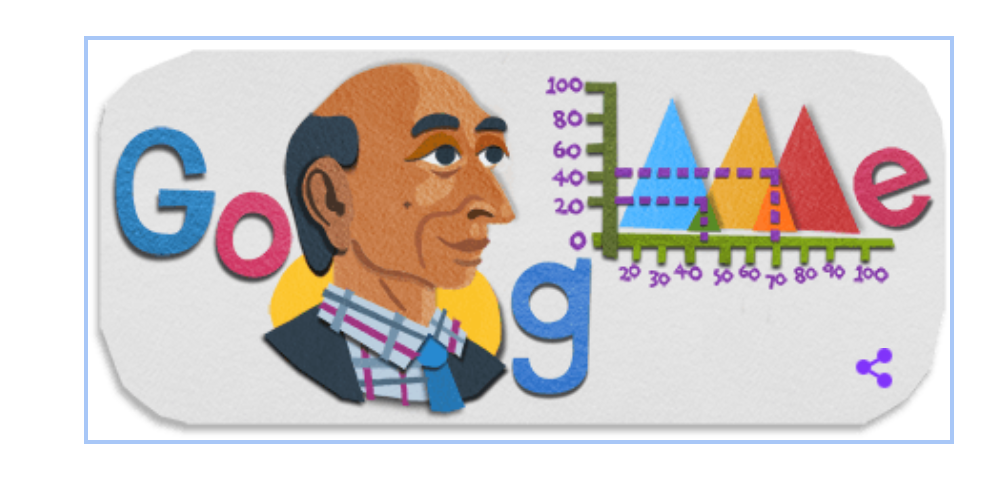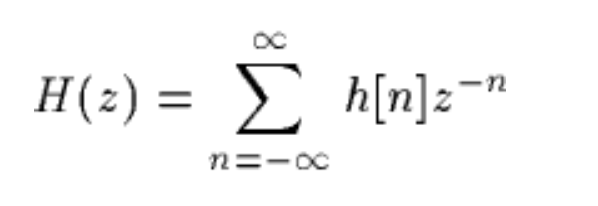Lotfi Zadeh and the z transform
« previous post | next post »
The Google Doodle for November 30 featured Lotfi Zadeh.

The Doodles page explains that
Today’s Doodle celebrates world-renowned Azerbaijani-American computer scientist, electrical engineer, and professor, Lotfi Zadeh. On this day in 1964, Zadeh submitted “Fuzzy Sets,” a groundbreaking paper that introduced the world to his innovative mathematical framework called “fuzzy logic.”
You can learn more about this contribution from the Wikipedia page on Fuzzy Mathematics. What I learned, from reading the Other Contributions section of Zadeh's Wikipedia page, was his role in the invention (discovery?) of the z-transform.
In my lecture notes on the z transform, 20-odd years ago, I wrote:
The z transform is unusual, in being named after a letter of the alphabet rather than a famous mathematician. The Fourier transform is named after Baron Jean Baptiste Joseph Fourier (1768-1830); the Walsh-Hadamard transform is named after J.L. Walsh (1895-1973) and Jacques Salomon Hadamard (1865-1963); we haven't discussed the Laplace and Hilbert transforms yet, but we will (at least briefly), and they are named after Pierre-Simon de Laplace (1749-1827) and David Hilbert (1862-1943) respectively.
Laplace transforms have long been used in solving (continuous-time) linear constant-coefficient differential equations.
According to p 420 of Contemporary Linear Systems (Strum and Kirk 1994),
A method for solving linear, constant-coefficient difference equations by Laplace transforms was introduced to graduate engineering students by Gardner and Barnes in the early 1940s. They applied their procedure, which was based on jump functions, to ladder networks, transmission lines, and applications involving Bessel functions. This approach is quite complicated and in a separate attempt to simplify matters, a transform of a sampled signal or sequence was defined in 1947 by W. Hurewicz as
which was later denoted in 1952 as a "z transform" by a sampled-data control group at Columbia University led by professor John R. Raggazini and including L.A. Zadeh, E.I. Jury, R.E. Kalman, J.E. Bertram, B. Friedland, and G.F. Franklin.
The Hurewicz equation is not expressed in the same way as the z transform we have introduced — it is one-sided, and it is expressed as a function of the sampled data sequence f rather than the complex number z — but the relationship is clear, and the applications were similar from the beginning. So perhaps the z transform should really be called the "Hurewicz transform" — but it is too late to change.
In fact the 1952 paper introducing the z transform had just two authors: John R. Ragazzini and Lotfi A. Zadeh, "The analysis of sampled-data systems", Transactions of the American Institute of Electrical Engineers, Part II: Applications and Industry. At that point, Zadeh was an assistant professor at Columbia, where Ragazzini was chair of the Electrical Engineering department.
The discussion section of that paper starts with this comment, which suggests that the term "z-transform" (based on the variable name in the defining equation) might already have been used in reference to Hurewicz's work:
John M. Salzer (Hughes Aircraft Company, Culver City, Calif.): The objectives of this paper are: (a) to unify the z-transform (Shannon, Hurewicz) and s-transform (Linvill) approaches to sampled-data systems; (b) to formulate input-output relations for various types of such systems; and (c) to treat such systems by considering the sampler a time-variant element.
The paper fills a clear need in this underpublished field, and it presents its topic concisely and illuminatingly. It brings together two viewpoints, (a) and (c), to bear on the same problem and shows the way toward systematization (b) of the solution.
Ragazzini & Zadeh's 1952 paper doesn't cite any publication by Hurewicz, so I'm relying on secondary sources for the attribution to him of z as the variable name. But maybe the connection to the first letter of Zadeh is not an accident? Or even if it's a coincidence, as seems likely, maybe we should embrace it and start referring to the "Zadeh transform" :-)…
This is Language Log and not Foundations of Mathematics Log or Electrical Engineering Log, so what do Lotfi Zadeh's contributions have to do with language? There's obviously a relevant tradition of work on applications of fuzzy set theory and fuzzy logic to NLP — but there was also a good reason for including the z transform in a course on Digital Signal Processing for people interested in the analysis of speech. As I wrote in those lecture notes,
[T]he z transform has an enormous — though indirect — practical value. As we'll soon see, we can use it to perform a valuable analysis of an arbitrary linear constant-coefficient difference equation, deriving an expression for the z transform of the system's impulse response which we can use to calculate the system's "poles" and "zeros" in the frequency domain.
[Note: In some place, for example the Wikipedia article, it's "Z-transform" with a capital Z. And sometimes there's a hyphen separating the variable-name and the word transform. But I think historically the lower-case z, with or without a hyphen, is the normal usage.]

Rodger C said,
December 1, 2021 @ 10:29 am
Note that his name was Americanized: Lotfi Aliasker Zadeh's father was Rahim Aleskerzade.
[(myl) There may also have been some influence of the 12 years that Lotfi Zadeh spent in Iran, 1931-1943. However spelled in latin characters, Zadeh is (originally) a Persian word.]
KeithB said,
December 1, 2021 @ 10:39 am
Is Fuzzy Logic good for anything? While this is long in the tooth, the late great Bob Pease was not a fan:
https://www.electronicdesign.com/technologies/digital-ics/article/21757343/whats-all-this-fuzzy-logic-stuff-anyhow
[(myl) I've never used Fuzzy Logic in my own research projects, but Google Scholar yields "about 45,000 results" in the past two years. ]
cameron said,
December 1, 2021 @ 11:50 am
He was an ethnic Azeri, born in Baku; but he was an Iranian ethnic Azeri. He was born in Baku because his Iranian father happened to be on assignment there as a journalist.
His father probably chose that last name. It was during that period under Reza Pahlavi that people chose official last names, on the European model. Lotfi broke it into two bits when he moved to the US, because he realized Aliaskerzadeh is a bit of a mouthful for native English speakers.
Kenny Easwaran said,
December 1, 2021 @ 11:55 am
Re KeithB – When I was in graduate school at Berkeley's program in Logic, Zadeh was an affiliated faculty member. He gave one talk on fuzzy logic at the colloquium series during the time I was there. The logicians from the math and philosophy departments spent a long time in the question period trying to figure out in what sense fuzzy logic is a type of logic. The impression I got then, and have occasionally reinforced in the years since, is that "fuzzy logic" is better understood as something like a language for control systems that enables you to describe the controls in ways that are relatively intuitive for speakers of a natural language that has vague predicates, that automatically translates them into continuous controls that deal with the magnitudes that underlie these vague predicates.
Whether or not it's actually a system of logic, it certainly seems to be extremely widely used in the design of systems like rice cookers and washing machines (and probably lots of other non-customer-facing electronics).
Coby Lubliner said,
December 1, 2021 @ 12:39 pm
cameron: I have a recollection of Lotfi telling me that his father was the Iranian consul in Baku. Where did you get the journalist connection?
Mark Meckes said,
December 1, 2021 @ 1:12 pm
Although it is most common for mathematical gadgets to be named after some famous mathematician (possibly the discoverer, possibly not), it's actually not at all unusual to name things after the letters of the alphabet typically used in describing them.
One of the most familiar examples is the QR decomposition, which gives a particular way of writing a matrix as a product of two matrices which are traditionally named Q and R. This isn't an abbreviation: Q and R don't stand for anything, that's just what we typically use.
Philip Taylor said,
December 1, 2021 @ 1:24 pm
There is a small (probably very small) subset of humanity that finds etymology-free names very annoying. I remember very early on in my work with Java finding that the recommended library for the tasks I had to tackle was "Swing". Thinking that "Swing" was derived from Standardised-WINdows-Graphics, I got stuck in, only to then discover that "Swing" means nothing at all — it is a purely arbitrary name with no etymology whatsoever. At that point I became so disenchanted that I sought other, non-Swing, means of achieving my aims.
KeithB said,
December 1, 2021 @ 1:43 pm
Then there is the "Student's t-test" the best of both worlds.
mmm, beer,
CuConnacht said,
December 1, 2021 @ 2:28 pm
If I am not mistaken, Aliaskerzadeh will be the Persian for "Son of Ali Asghar," Ali Asghar being a common name among Shiite Muslims, after "the younger Ali", as distinct from Ali Akbar, the older Ali, both of whom are among the Imams venerated by Iranian Shiites.
David L said,
December 1, 2021 @ 10:24 pm
That equation for the z transform doesn't make sense to me. Since the RHS is a sum over all integer values of k, there shouldn't be a k on the LHS. And the RHS has a term z that is undefined and doesn't appear on the LHS. Should the LHS be Z[f(zT)]?
[(myl) That's not the equation for the z transform, it's my transcription of (what Strum and Kirk 1994) identify as the (vaguely related and long abandoned) equation from Hurewicz 1947, only of historical relevance. At some point I'll check the transcription and try to identify and find the Hurewicz publication. The (two-sided) z transform equation is


as given in my lecture notes — or similarly in the Wikipedia article:
]
Rodger C said,
December 2, 2021 @ 10:40 am
@CuConnacht: Yes, I'm used to seeing "-zadeh" as a suffix in names all over the Persosphere. Cf. the Turkish folklorist, Fuat Köprülüzâde.
David Marjanović said,
December 2, 2021 @ 2:10 pm
Brand names are usually etymology-free these days: chosen for whatever abstract emotions people think they sound like, and unique so they can be trademarked more easily. Creating them, which involves plenty of polling to find out what people think they sound like, is a well-paid profession.
DavidP said,
December 2, 2021 @ 7:16 pm
Rodger C – In addition to the folklorist, there's the folklore: Scheherazade
Rodger C said,
December 3, 2021 @ 11:05 am
Teh Wiki confirms my impression that "the name Scheherazade derives from an Arabic form of the Middle Persian name Čehrāzād, which is composed of the words čehr ('lineage') and āzād ('noble, exalted')."